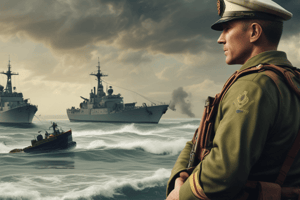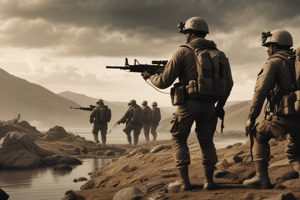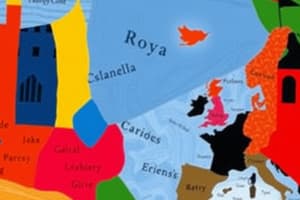Podcast
Questions and Answers
What was the role of the headman in the local policing system from 870 to 1370?
What was the role of the headman in the local policing system from 870 to 1370?
The headman was responsible for swearing in men to keep the peace in their tribe or village.
What significant development occurred around 1195 in the evolution of policing?
What significant development occurred around 1195 in the evolution of policing?
Justices of the Peace were appointed by the Crown to hear and determine cases.
What major reform did Sir Robert Peel introduce in 1829?
What major reform did Sir Robert Peel introduce in 1829?
Sir Robert Peel formed the Metropolitan Police Force.
What was the purpose of the solemn obligation that every person entered into from the 14th to 19th Century?
What was the purpose of the solemn obligation that every person entered into from the 14th to 19th Century?
How did the concept of police evolve during the third stage of policing development?
How did the concept of police evolve during the third stage of policing development?
List the significant influence that the British Police System had on the Royal St. Lucia Police Force.
List the significant influence that the British Police System had on the Royal St. Lucia Police Force.
What was one of Sir Robert Peel's contributions to law enforcement besides forming the Metropolitan Police?
What was one of Sir Robert Peel's contributions to law enforcement besides forming the Metropolitan Police?
During which period did the Office of the Constable see continual growth of responsibilities?
During which period did the Office of the Constable see continual growth of responsibilities?
What is the primary mission of the police according to Peel's principles?
What is the primary mission of the police according to Peel's principles?
How is the police's ability to perform their duties impacted?
How is the police's ability to perform their duties impacted?
What happens to public cooperation as police use physical force?
What happens to public cooperation as police use physical force?
According to Peel, how should police seek public favor?
According to Peel, how should police seek public favor?
What should police do when persuasion and advice are insufficient?
What should police do when persuasion and advice are insufficient?
What is Peel's view on the relationship between police and the public?
What is Peel's view on the relationship between police and the public?
When was the police force established in St. Lucia?
When was the police force established in St. Lucia?
What major concern did Major E.O. Plunkett report regarding police recruitment?
What major concern did Major E.O. Plunkett report regarding police recruitment?
What title was introduced for the head of the police force in St. Lucia in 1891?
What title was introduced for the head of the police force in St. Lucia in 1891?
According to Peel, what is the test of police efficiency?
According to Peel, what is the test of police efficiency?
What significant change occurred to the Royal St. Lucia Police Force's title in 1966?
What significant change occurred to the Royal St. Lucia Police Force's title in 1966?
Who were the first two instructors of local police training that began in 1947?
Who were the first two instructors of local police training that began in 1947?
When did recruit training cease in St. Lucia?
When did recruit training cease in St. Lucia?
Who was the first St. Lucian to command the Royal St. Lucia Police Force?
Who was the first St. Lucian to command the Royal St. Lucia Police Force?
What major event in 1948 led to the change of the training venue for the police?
What major event in 1948 led to the change of the training venue for the police?
Name one of the vessels received by the Marine Unit for Coast Guard duties.
Name one of the vessels received by the Marine Unit for Coast Guard duties.
What role did the Senior Superintendent hold in addition to his police duties?
What role did the Senior Superintendent hold in addition to his police duties?
When was the Marine Unit initially trained by US Coast Guardsmen?
When was the Marine Unit initially trained by US Coast Guardsmen?
What was established in 1983 that changed the responsibilities of the police regarding port duties?
What was established in 1983 that changed the responsibilities of the police regarding port duties?
Who led the Commission of Enquiry into the Administrative Command and Discipline of the Force in 1988?
Who led the Commission of Enquiry into the Administrative Command and Discipline of the Force in 1988?
Flashcards
Origin of the Royal St. Lucia Police Force
Origin of the Royal St. Lucia Police Force
Evolved through stages starting with community peacekeepers to formal policing.
First Stage of Policing (870-1370)
First Stage of Policing (870-1370)
Community members maintained peace.
Second Stage of Policing (1195): Justices of the Peace
Second Stage of Policing (1195): Justices of the Peace
The Crown appointed them to adjudicate cases and enforce laws.
Third Stage of Policing (1829): Metropolitan Police
Third Stage of Policing (1829): Metropolitan Police
Sir Robert Peel established formal policing as a profession.
Signup and view all the flashcards
Peel's Core Policing Mission
Peel's Core Policing Mission
Prevention of crime and disorder.
Signup and view all the flashcards
Police Legitimacy
Police Legitimacy
Relies on public approval.
Signup and view all the flashcards
Public Cooperation
Public Cooperation
Essential for effective law observance.
Signup and view all the flashcards
Use of Force by Police
Use of Force by Police
Physical force should be minimized.
Signup and view all the flashcards
Police Impartiality
Police Impartiality
Serve impartially, unbiased.
Signup and view all the flashcards
Physical Force
Physical Force
Last resort when persuasion fails.
Signup and view all the flashcards
Police-Public Relationship
Police-Public Relationship
Police are community members.
Signup and view all the flashcards
Police Authority
Police Authority
Confined to policing roles, not judicial.
Signup and view all the flashcards
Police Effectiveness
Police Effectiveness
Measured by the absence of crime.
Signup and view all the flashcards
1831: Charter of Justice
1831: Charter of Justice
Established a Court of Police.
Signup and view all the flashcards
1834: Royal St. Lucia Police Force Formation
1834: Royal St. Lucia Police Force Formation
Headed by an Inspector.
Signup and view all the flashcards
1891: Chief of Police Title
1891: Chief of Police Title
Introduced by J. Jukes-Hughes.
Signup and view all the flashcards
Post-WWII Police Force
Post-WWII Police Force
Head of Force upgraded; workforce grew.
Signup and view all the flashcards
1946: Recruitment Challenges
1946: Recruitment Challenges
Local youths sought other jobs.
Signup and view all the flashcards
1947: Police Training
1947: Police Training
Training began near headquarters.
Signup and view all the flashcards
Notable Instructors
Notable Instructors
Gregg and Monlouis.
Signup and view all the flashcards
1948 Castries Fire
1948 Castries Fire
Training moved due to fire.
Signup and view all the flashcards
1956: Training in Barbados
1956: Training in Barbados
Officers trained in Barbados.
Signup and view all the flashcards
David Douglas Mc Goun
David Douglas Mc Goun
Became leader in 1956.
Signup and view all the flashcards
1966: 'Royal' Title Added
1966: 'Royal' Title Added
Queen Elizabeth II visit.
Signup and view all the flashcards
Samuel H. Brooks
Samuel H. Brooks
First Commissioner from outside.
Signup and view all the flashcards
Stanley Clement Scholar
Stanley Clement Scholar
First St. Lucian Commissioner.
Signup and view all the flashcards
1984: Marine Unit Introduction
1984: Marine Unit Introduction
Vessel "Defender" acquired.
Signup and view all the flashcards
1988: Commission of Inquiry
1988: Commission of Inquiry
Karl Hudson-Phillips led the inquiry.
Signup and view all the flashcardsStudy Notes
History and Role of the Royal St. Lucia Police Force
- Originated from the British Police System, reflecting its evolution through three stages.
- First Stage (870-1370): Local policing system relying on community members to maintain peace.
- Second Stage (1195): Appointment of Justices of the Peace by the Crown to adjudicate cases and enforce laws.
- Third Stage (1829): Establishment of the Metropolitan Police by Sir Robert Peel, marking the formalization of policing as a full-time profession.
Peel's Nine Principles of Policing
- Core mission is the prevention of crime and disorder.
- Police legitimacy relies on public approval of their actions.
- Public cooperation is essential for effective law observance.
- Use of physical force by police should be minimized and only when necessary.
- Police should serve impartially and not be swayed by public opinion.
- Physical force is a last resort when persuasion fails.
- The police-public relationship emphasizes that police are community members dedicated to public service.
- Actions should be confined to policing roles without overstepping judicial powers.
- Police effectiveness is measured by the absence of crime rather than visible police presence.
History of Policing in St. Lucia
- 1831: Establishment of a Charter of Justice and creation of a Court of Police.
- 1834: Formation of the Royal St. Lucia Police Force; initially headed by an Inspector with limited personnel.
- 1891: Title of Chief of Police introduced by J. Jukes-Hughes.
- Post-WWII: Head of the Force upgraded to Senior Superintendent; workforce grew.
- 1946: Major E.O. Plunkett reports on challenges in recruitment, with local youths drawn to other employment opportunities.
- Crime in 1946 included 1,923 reports but no murders; communication and transport were major issues for policing.
Royal St. Lucia Police Training School
- 1947: Training for local police began; initial sessions held near Police Headquarters.
- Notable instructors included Staff Sergeant Gregg and Corporal Monlouis.
- Training moved locations due to the 1948 Castries Fire, eventually shifting to Beanfield and then to current premises.
- 1956: St. Lucia ceased local recruit training, with officers trained in Barbados until a local training facility was established in 1981 due to demand.
- Leadership Changes: David Douglas Mc Goun became the leader in 1956, with the formation of the Special Reserve that year.
Royal St. Lucia Police Force Developments
- 1966: Title “Royal” added after a visit from Queen Elizabeth II and Prince Philip.
- Samuel H. Brooks was the first Commissioner of Police from outside St. Lucia.
- Stanley Clement Scholar became the first St. Lucian Commissioner in 1972.
- 1984: Introduction of a Marine Unit with the acquisition of the vessel "Defender" for coast guard duties.
- 1986: Marine Unit expansion faced challenges, including the destruction of the vessel "Helen II" by fire.
- 1988: Commission of Inquiry into the police force's administration and discipline led by Karl Hudson-Phillips.
Studying That Suits You
Use AI to generate personalized quizzes and flashcards to suit your learning preferences.




